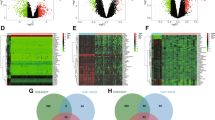Abstract
Purpose
Increasing evidences suggest dysfunctions of microRNAs (miRNAs) are playing important part in tumors. Therefore, the role of miR-802 in osteosarcoma (OS) was exploited. The object was to evaluate the effect of miR-802 and verify its influence on p27 Kip1 (p27) in OS.
Methods
RT-qPCR experiment was used to detect miR-802 and p27 expression in OS tissues and cells. We explored the function of miR-802 through Transwell assays. The phosphoinositide 3-kinase (PI3K)/AKT serine/threonine kinase pathway and epithelial–mesenchymal transition (EMT) was detected by Western blot assays. Luciferase assay was used to testify the target of miR-802.
Results
MiR-802 expression was elevated in OS, which was related to poor clinical outcome in OS patients. MiR-802 overexpression promoted OS migration, invasion and EMT. Further, p27 is a direct target of miR-802. P27 elevation counteracted the promotion effect of OS on EMT, migration and invasion induced by miR-802. In addition, miR-802 overexpression inactivated PI3K/AKT pathway via targeting p27 in OS.
Conclusion
MiR-802 promoted the progress of EMT, migration and invasion in OS via targeting p27. This newly identified miR-802/p27/PI3K/AKT axis may represent potential targets for OS.





Similar content being viewed by others
References
Li J, Yang Z, Li Y, et al. Cell apoptosis, autophagy and necroptosis in osteosarcoma treatment. Oncotarget. 2016;7(28):44763–78.
Bhattasali O, Vo AT, Roth M, et al. Variability in the reported management of pulmonary metastases in osteosarcoma. Cancer Med. 2015;4(4):523–31.
Vos HI, Coenen MJ, Guchelaar HJ, Te Loo DM. The role of pharmacogenetics in the treatment of osteosarcoma. Drug Discov Today. 2016;21(11):1775–86.
Amankwah EK, Conley AP, Reed DR. Epidemiology and therapies for metastatic sarcoma. Clin Epidemiol. 2013;5:147–62.
Bishop MW, Janeway KA, Gorlick R. Future directions in the treatment of osteosarcoma. Curr Opin Pediatr. 2016;28(1):26–33.
Isakoff MS, Bielack SS, Meltzer P, Gorlick R. Osteosarcoma: current treatment and a collaborative pathway to success. J Clin Oncol. 2015;33(27):3029–35.
Croce CM. Causes and consequences of microRNA dysregulation in cancer. Nat Rev Genet. 2009;10(10):704–14.
Squadrito ML, Etzrodt M, De Palma M, Pittet MJ. MicroRNA-mediated control of macrophages and its implications for cancer. Trends Immunol. 2013;34(7):350–9.
Zavala-Yoe R, Ramirez-Mendoza RA, Cordero LM. Entropy measures to study and model long term simultaneous evolution of children in Doose and Lennox-Gastaut syndromes. J Integr Neurosci. 2016;15(2):205–21.
Liu W, Zhou Z, Zhang Q, et al. Overexpression of miR-1258 inhibits cell proliferation by targeting AKT3 in osteosarcoma. Biochem Biophys Res Commun. 2019;510(3):479–86.
Ren J, Yang M, Xu F, Chen J. microRNA-758 inhibits the malignant phenotype of osteosarcoma cells by directly targeting HMGA1 and deactivating the Wnt/beta-catenin pathway. Am J Cancer Res. 2019;9(1):36–52.
Hu XH, Zhao ZX, Dai J, et al. MicroRNA-221 regulates osteosarcoma cell proliferation, apoptosis, migration, and invasion by targeting CDKN1B/p27. J Cell Biochem. 2019;120(3):4665–74.
Hnit SS, Xie C, Yao M, et al. p27(Kip1) signaling: transcriptional and post-translational regulation. Int J Biochem Cell Biol. 2015;68:9–14.
Kim TH, Lee HH, Chung SH, et al. Expression of p27 and Jun activation domain-binding protein 1 in endometriosis. Arch Gynecol Obstet. 2015;292(2):377–81.
Shao J, Li S, Palmqvist L, et al. p27(KIP1) and PTEN cooperate in myeloproliferative neoplasm tumor suppression in mice. Exp Hematol Oncol. 2015;5:17.
Montanaro L, Trere D, Derenzini M. Changes in ribosome biogenesis may induce cancer by down-regulating the cell tumor suppressor potential. Biochem Biophys Acta. 2012;1825(1):101–10.
Wang Y, Zeng J, Pan J, et al. MicroRNA-200c is involved in proliferation of gastric cancer by directly repressing p27(Kip1). Biochem Biophys Rep. 2016;8:227–33.
Thomas DM, Johnson SA, Sims NA, et al. Terminal osteoblast differentiation, mediated by runx2 and p27KIP1, is disrupted in osteosarcoma. J Cell Biol. 2004;167(5):925–34.
Gianferante DM, Mirabello L, Savage SA. Germline and somatic genetics of osteosarcoma—connecting aetiology, biology and therapy. Nat Rev Endocrinol. 2017;13(8):480–91.
Lindsey BA, Markel JE, Kleinerman ES. Osteosarcoma overview. Rheumatol Ther. 2017;4(1):25–43.
Zhuang M, Qiu X, Cheng D, et al. MicroRNA-524 promotes cell proliferation by down-regulating PTEN expression in osteosarcoma. Cancer Cell Int. 2018;18:114.
Gao G, Tian Z, Zhu HY, Ouyang XY. miRNA-133b targets FGFR1 and presents multiple tumor suppressor activities in osteosarcoma. Cancer Cell Int. 2018;18:210.
Jiang C, Liu X, Wang M, et al. High blood miR-802 is associated with poor prognosis in HCC patients by regulating DNA damage response 1 (REDD1)-mediated function of T cells. Oncol Res. 2019;27(9):1025–34.
Zhang Q, Lv R, Guo W, Li X. microRNA-802 inhibits cell proliferation and induces apoptosis in human cervical cancer by targeting serine/arginine-rich splicing factor 9. J Cell Biochem. 2019;120(6):10370–9.
Zhang XY, Mu JH, Liu LY, Zhang HZ. Upregulation of miR-802 suppresses gastric cancer oncogenicity via targeting RAB23 expression. Eur Rev Med Pharmacol Sci. 2017;21(18):4071–8.
Cao ZQ, Shen Z, Huang WY. MicroRNA-802 promotes osteosarcoma cell proliferation by targeting p27. APJCP. 2013;14(12):7081–4.
Di Leva G, Garofalo M, Croce CM. MicroRNAs in cancer. Annu Rev Pathol. 2014;9:287–314.
Author information
Authors and Affiliations
Contributions
LG conceived and designed the study and drafted the manuscript. SJ and QZ collected, analyzed and interpreted the experimental data. YX, CL and YL revised the manuscript for important intellectual content. All authors read and approved the final manuscript.
Corresponding author
Ethics declarations
Conflict of interest
The authors declare that they have no conflict of interest.
Ethical approval
The study was approved by Ethical Committee of Weifang Weiyi Tumor Hospital and conducted in accordance with the ethical standards. Approval No. 2012-11.
Research involving human participants and/or animals
All procedures carried out in studies involbing human participants are consistent with the ethical standards of institutions and/or national research councils, as well as with the 1964 Helsinki Declaration and its subsequent amendments or similar ethical standards.
Informed consent
Subjects signed the informed consent.
Additional information
Publisher's Note
Springer Nature remains neutral with regard to jurisdictional claims in published maps and institutional affiliations.
Rights and permissions
About this article
Cite this article
Gao, .F., Jia, S., Zhang, .M. et al. MicroRNA-802 promotes the progression of osteosarcoma through targeting p27 and activating PI3K/AKT pathway. Clin Transl Oncol 24, 266–275 (2022). https://doi.org/10.1007/s12094-021-02683-w
Received:
Accepted:
Published:
Issue Date:
DOI: https://doi.org/10.1007/s12094-021-02683-w




